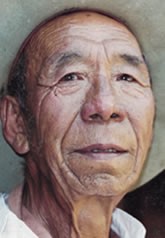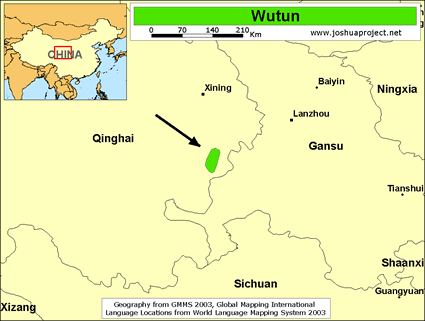The Chinese government does not recognize the Wutun as a separate people group but includes them under the Tu nationality. The Wutun resist this classification and insist on their own status. There are also ethnic Tu people in the same area, but the two groups cannot understand each other's language. Neighboring Tibetan peoples refer to the Wutun as Sanggaixiong, meaning "the center of the lion."
According to Wutun oral history, a long time ago a Tibetan king sent soldiers to where the Wutun now live to drive off other groups in the area. The soldiers stayed and married women from other tribes. Together they eventually became the Wutun people. Some say the soldiers came from Lhasa. The Wutun children began to speak their mother's language and could not speak Tibetan - the language of their fathers - so they lost their original language. Today all Wutun family names are Tibetan language names and not Tu names.
Many of the Wutun are skilled artists. Buddhist scenes and the Buddha himself are the most common subjects of their paintings. They claim their artistic skills came about because the original soldiers studied art in Nepal.
Tibetan Buddhism is the only religion among the Wutun. They are fanatical believers. Their whole ethnic identity is bound up in their religion. Although they do not have their own temples, the Wutun frequent Tibetan temples in the Tongren area. Like all Buddhists, the Wutun believe they will end up in a state of bliss after death. But being better and more privileged, they believe they will go there directly, while other Buddhists achieve enlightenment only after going through many trials and testings.
The Wutun have an almost complete lack of knowledge about the existence of Christianity. In the 1920s and 1930s there were Christian and Missionary Alliance workers nearby. In 1996 a 74-year-old Wutun man told a visitor, "When I was a small boy, I heard something about this Jesus religion, but I did not understand. There are no believers in any other religions among us Wutun except for Buddhism. We are not interested in any new religions because we know that we have the best and only true religion in the world."
The Wutun people need to put their trust and identity in the hands of the loving God of Creation who sent his son to make it possible for them to enter the Kingdom of God.
Pray for the spiritual blindness and bondage to the evil one to be removed so they can understand and respond to Christ.
Pray for the Lord to provide for their physical and spiritual needs as a testimony of his power and love.
Pray the Wutun people will have a spiritual hunger that will open their hearts to the King of kings.
Pray for an unstoppable movement to Christ among them.
Scripture Prayers for the Wutun in China.
Operation China, Asia Harvest, Copyrighted © Used with permission
| Profile Source: Joshua Project |











